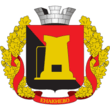Yenakiieve
| Yenakieve Єнакієве | |||
|---|---|---|---|
| |||
 Yenakieve | |||
| Coordinates: 48°13′00″N 38°12′00″E / 48.21667°N 38.20000°ECoordinates: 48°13′00″N 38°12′00″E / 48.21667°N 38.20000°E | |||
| Country |
| ||
| Oblast |
| ||
| City Municipality | Yenakiieve | ||
| Founded | 1782 | ||
| City rights | 1925 | ||
| Government | |||
| • Mayor | Valeriy Oleynik[1] | ||
| Area | |||
| • City | 39.2 km2 (15.1 sq mi) | ||
| Population (2012 census) | |||
| • City | 84,187 | ||
| • Density | 2,653/km2 (6,870/sq mi) | ||
| • Metro | 161,500 | ||
| Time zone | EET (UTC+2) | ||
| • Summer (DST) | EEST (UTC+3) | ||
| Postal code | 86400—86470 | ||
| Area code(s) | +380 6252 | ||
| Website | Verkhovna Rada of Ukraine | ||
Yenakieve (Ukrainian: Єнáкієве, Yenakiyeve; Russian: Ена́киево, Yenakiyevo), is a city in the Donetsk Oblast (province) of eastern Ukraine and carries a special status within the region designated into a separate city raion (district). The city is located on the Krynka River about 60 kilometres (37 mi) from the oblast's administrative center, Donetsk.
Yenakiieve is an important regional centre of coal mining, metallurgy, chemical production and manufacturing. The city's outdated industry has caused accidents like that of a gas explosion which occurred in June 2008 at one of Yenakiieve's coal mines.
Yenakiieve was founded in 1898 when numerous workers settlements around the Peter's Iron and Steel Works were united into a single settlement named after Fyodor Yenakiyev. Its first coal mines were established already in 1883. The settlement was incorporated as a city in 1925.
In Yenakiieve located one of the oldest metallurgical factories of Ukraine - Yenakiieve Iron and Steel Works
As of the 2001 Ukrainian Census, its population is 104,000. Based on the census results, 13.8% of the city's population uses the Ukrainian language in their daily life, while more than 86% use Russian. The city is known as the birthplace of the President of Ukraine, Viktor Yanukovych.
History
Permanent settlements on the territory of present day Enakievo were founded in 1783. In 1858 Sofiyevsky coal mine was opened there. At the same time Petrovsky cast-iron plant was constructed.
In 1895 engineers F. Yenakiev and B.Yalovetsky and several Belgian businessmen founded a Russian-Belgian metallurgic society which by 1897 constructed a new Petrovsky cast-iron plant around the settlement Fyodorovka. Coal mines were opened around the plant. Settlements were formed near them and in 1898 they were united into one called Enakievsky after the founder of the Russian-Belgian metallurgic society. The writer A. I. Kuprin who worked at the plant in 1896 described workers’ lives in the story “Molokh”. Before World War I several plants were built in Yenakievo: coke chemical, brick, beer brewing and butter making. Petrovsky plant became one of the largest metallurgic plants (3rd place) in southern Russia. In 1913 it produced 349,200 tons of cast-iron and 316,400 tons of steel. As a result of ruin after World War I and Civil War of 1919-1921 Petrovsky plant was the only one producing steel. By 1925 the population in Enakievo was 34,000, it was referred to as a town.
In 1928 the town was renamed into Rykovo, after Soviet party- and statesman A. I. Rykov. After Rykov was arrested in 1937 and the town was renamed into Ordzhonikidze after another Soviet party- and statesman G. K. Ordzhonikidze. The name Yenakiyevo was returned to the town in 1943. By 1939 the population of the town was 88,200.
During the World War II Enakievo was under siege from Italian army auxiliary units that were seconded to the German Army. They were followed by German units. The city was attacked from 31 October 1941 and not freed until 3 September 1943. Street fighting was fierce between the end of November and beginning of December 1941. “Recruitment” of civilians (ostarbeiter = east workers) began in December 1941. In 1950 about 12 or so Italian POWs (prisoners of war) were put to trial, over atrocities in Yenakievo (including the destruction of a hospital). Apparently no convictions were registered, and by 1954 all Italian POWs were returned to Italy.
In 1950s several plants were put into operation: of ferro-concrete items, of construction material, of house building, automobile-repairing. On September 16, 1979, on the territory of Enakievo in the mine “Yuny Communar” there was a nucleus explosion - an object “Klivazh”. In 2002 the mine was closed as non-perspective and environmentalists worry about the danger of filling the mine with water. It might cause radioactive pollution of underground water. That’s why pumps continue to pump the water out of abandoned mine.
References
- ↑ (Ukrainian) На виборах мера Єнакієвого зафіксовано «вкидання бюлетенів», ICTV (16 December 2012)
(Ukrainian) Мером Єнакієвого став регіонал, ICTV (17 December 2012)
External links
| Wikimedia Commons has media related to Yenakiieve. |
- "City of Yenakieve, Donetsk Oblast". Verkhovna Rada of Ukraine (in Ukrainian). Retrieved 2008-06-09.
| |||||||||||||||||||||||

